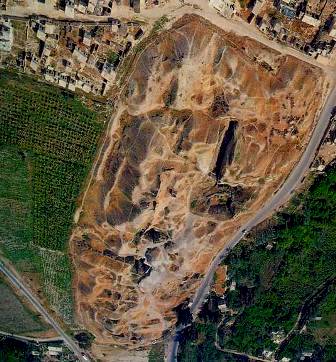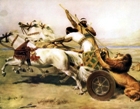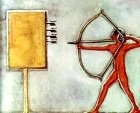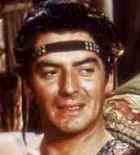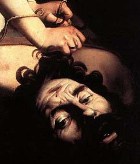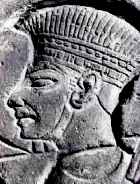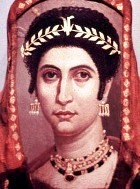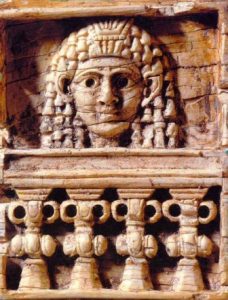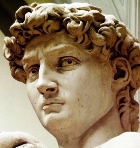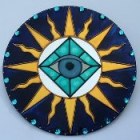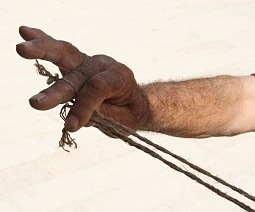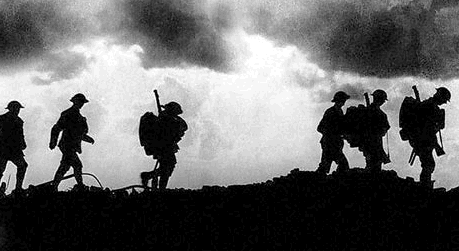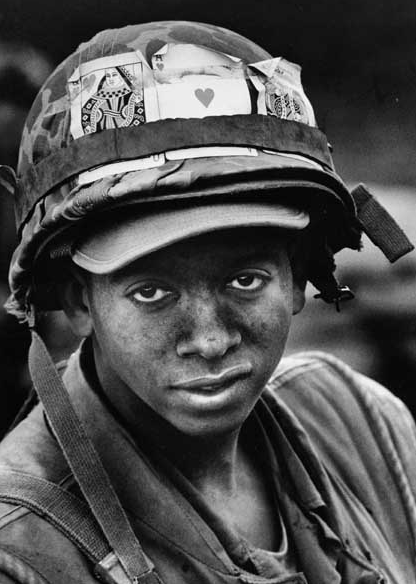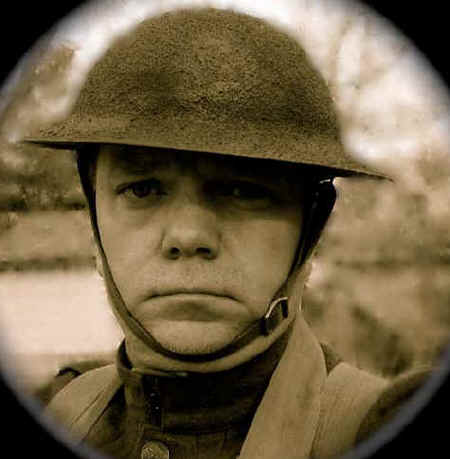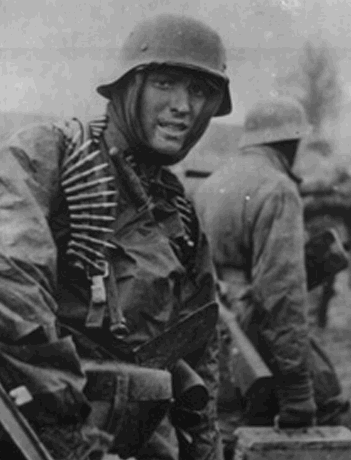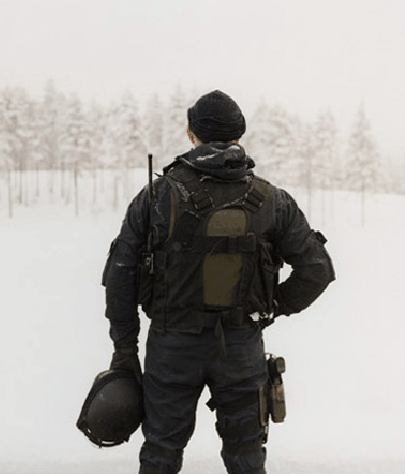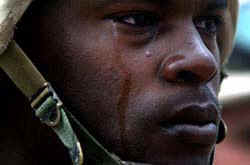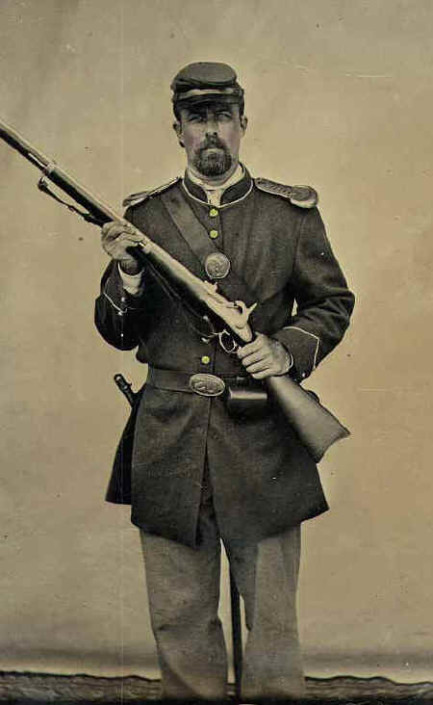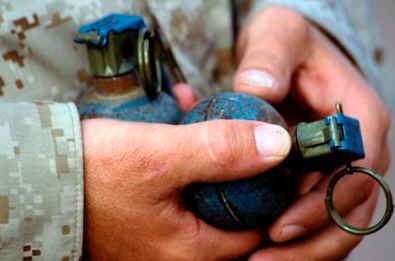Samson: strongman
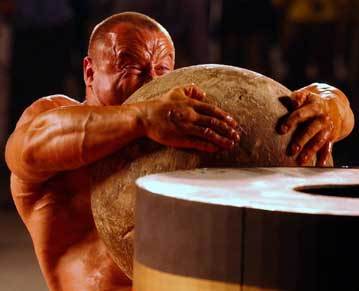
Bible Soldiers & Warriors: Samson.
Samson was an exceptionally strong man, a giant impossible to beat. He never needed to bargain.
He was not attached to any formal army, like other ancient heroes like Achilles in the Iliad. Instead, he used his personal strength to take on any enemy. He caused mayhem on many occasions.
Some of his feats include:
- the wedding riddle used at his marriage to the Philistine girl from Timnah, where Samson killed thirty Philistines in revenge on the Philistine men who bribed his wife to obtain the answer to the riddle
- his final escapade with Delilah, who deceived him to learn the secret of his strength.
One of the weapons used by Samson was the jawbone of an ass (see photograph below). He used it as an improvised club.
Improvisation and ingenuity were especially valued by the Jewish tribes. Why? Because they were forbidden by the Philistines to smelt or work metal, and so were unable to produce metal weapons themselves. This was clearly a disadvantage when fighting an enemy.
Anyone who could get around this problem by inventing
- a different way of fighting (guerrilla warfare) or
- an efficient non-metal weapon (the jawbone of an ass used as a club)
was clearly an asset to the beleagued tribes.
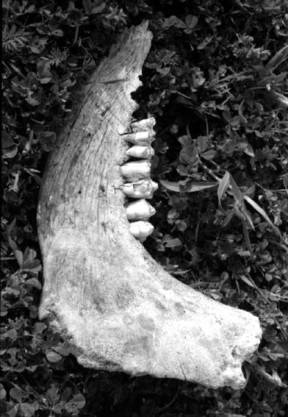
The jawbone of an ass
When the Philistines learned the reason behind Samson’s prodigious strength, they captured him and put out his eyes making him, they thought, utterly helpless.
Some time later, he was led into the temple of Dagon and made sport of as part of the day’s entertainment.
But unnoticed by the Philistines, his hair had begun to grow back…
In one last magnificent effort, he pulled the two supporting pillars of the temple apart, burying himself and up to three thousand Philistines in the rubble.
David, boy warrior
Everyone is familiar with the story of David and Goliath -the boy warrior who defeated an enemy much stronger and meaner than himself.
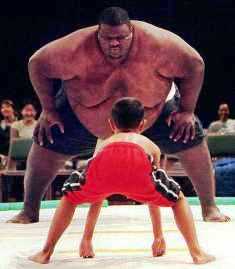
Bible Soldiers & Warriors: David faces Goliath!!
Why is the story so famous?
It was a mirror of the situation that daily faced the Israelites – they were militarily and technologically inferior to their enemy the Philistines, and only guile and the tactics of guerrilla warfare got them through.
Later, when David became king, he faced the Philistines in two decisive battles, at Baal Perazim and Rephaim near Jerusalem.
He defeated the Philistines and pushed them back onto the coastal plain, where they were less of a threat to him and his people.
He did something else that had never been done in Israel before, and was not popular: he decided to ignore the tribal militia and use mercenary troops instead – the Cherethites and Pelethites.
Why was this so important? Because the two cohorts were a decisive factor in a later battle – when David’s son Solomon wrested the throne from his older brother Adonijah. For the first time in Israel’s history, foreign mercenaries were used in an internal battle.
David was a soldier with a vision: he set out to create an empire.
In the first phase of his plan, he attacked the last strongholds of the native Canaanite population in the north, and added Megiddo, Beth Shean and Taanach to his territory.
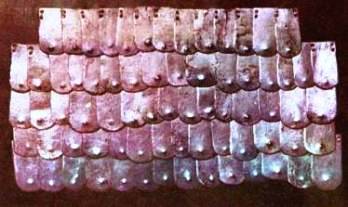
Scale armor. Each small metal plate was attached to a leather thong so that the pieces formed a protective surface for the warrior who wore it.
Why was this so important? Because he broke the Philistine monopoly on metal manufacture. This meant that he was able to put far better weapons into the hands of his soldiers.
David then undertook successful campaigns against the Moabites, Edom and then the Ammonites – giving him an outlet to the Red Sea.
Lastly, he defeated the Arameans and annexed Aram-Zobah and Damascus, so that the borders of his kingdom may have reached as far as the Euphrates River.
Not bad for a boy who started life as a shepherd…
Joshua & the Promised Land
Joshua was Moses’ successor as leader of the Hebrew tribes when they scrambled for a foothold in the land of Canaan.
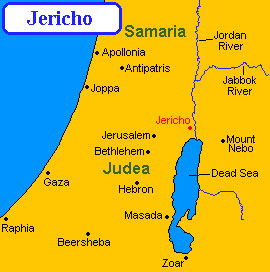 Almost all the great victories of that time are credited to him – though many of the battles were probably conducted by others. Instead of a sweeping conquest, Israel’s settlement of the land was a more complicated process.
Almost all the great victories of that time are credited to him – though many of the battles were probably conducted by others. Instead of a sweeping conquest, Israel’s settlement of the land was a more complicated process.
Nevertheless, the glory was Joshua’s, a true Bible soldier and warrior.
He is best-known for his extraordinary victory over Jericho, where ‘the walls came tumbling down’ – though the real hero of the story is Joshua’s God, who shows awesome power with only minimal assistance from the Israelite soldiers.
‘…when the priests blew with their trumpets, Joshua said unto the people, ‘Shout! for the Lord has given you the city. So that the people went up into the city, every man straight before him, and they took the city.”
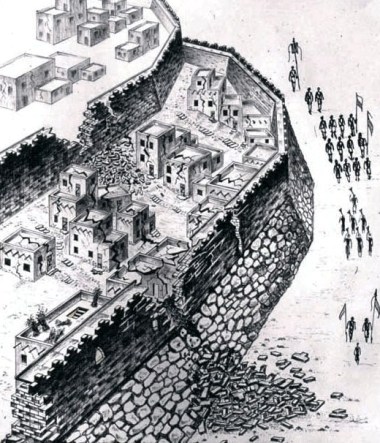
Reconstruction of the collapse of the walls surrounding Jericho.
This ruse is explicable in the light of a later one described in a Roman book of military ruses composed by Frontinus:
“When Domitius Calvinus was besieging Lueria, a town of the Lugerians protected not only by its location and siegeworks but also by the superiority of its defenders, he instituted the practice of marching frequently around the walls with all his forces, and then marching back to camp. When the townspeople had been induced by this routine to believe that the Roman commander did this for the purpose of drill, and consequently took no precautions against his efforts, he transformed this practice of parading into a sudden attack, and gaining possession of the walls, forced the inhabitants to surrender.”
Joshua used trickery to make up for his army’s lack of numbers, as for example in his capture of the city of Ai. His main aim was to draw the city’s inhabitants away from the fortifications, and then enter.
The plan is presented simply and clearly in Joshua 8: 3 –8:
Modern excavations of the biblical city of Jericho
… and Joshua chose thirty thousand mighty men of valour, and sent them away by night. And he commanded them, saying, ‘Behold, lie in wait against the city, even behind the city: go not very far from the city, but be ready: And I, and all the people that are with me, will approach the city: and it shall come to pass, when they come out against us, as at the first, that we will flee before them, for they will come out after us till we have drawn them from the city; for they will say, “They flee before us, as at the first”: therefore we will flee before them. Then ye shall rise up from the ambush and seize the city: for the Lord your God will deliver it into your hand.
The cities Joshua conquered were placed under the herem, the ban in holy war when everything that breathed, animal and human, was utterly destroyed.
In this instance Joshua’s God was a warrior god who advised the wholesale slaughter of the Canaanite population.
Joshua complied.
Gideon was wily
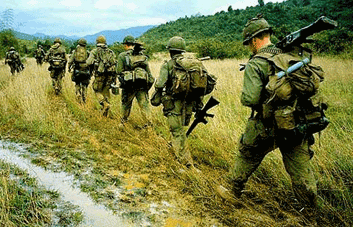
Mobile unit of camouflaged soldiers
Gideon was Israel’s fourth judge in the time between the death of Joshua and the beginning of the monarchy.
A ‘judge’ was not a legal official, but someone who was filled with the spirit of God and led military campaigns to defeat Israel’s enemies. He developed the strategy of guerrilla warfare, and it was the Israelites’ chosen method of fighting for many centuries.
Gideon became a judge after he was called by an angel.
At first he was doubtful that it was God who was commissioning him, but once convinced he threw himself into the task of fighting the Midianites and the Amalekites, enemies of the Israelite tribes.
With an army of 300 men, chosen from a much larger group by a series of tests, Gideon attacked the Midianite camp at night, panicked and then routed them. The Midianite leaders were captured and beheaded.

Scooping water from a stream, using cupped hands
His selection of the 300 warriors makes an interesting story. He had more volunteers than he needed, so he had to choose between them.
God instructed him to choose the men who drank from a stream by lying full-length and lapping at the water. This meant they had to lie on the ground, dunk their face into the water and gulp it up directly, rather than cupping water in their hands which is a more ‘civilized’ thing to do.
Note: a human tongue cannot lap up water the way a dog does; it doesn’t have the flexibility or length of a dog’s tongue.
Why did God choose the ‘gulpers’? Perhaps because of their physical and psychological fighting capacity.
- Those who were too fastidious to fling themselves on the ground and gulp the water may have shown insufficient adaptability, a reluctance to face discomfort.
- Those who lay full length on the ground offered the enemy a reduced target, perhaps a signal that they have faced an enemy before and learnt the hard lessons of war.
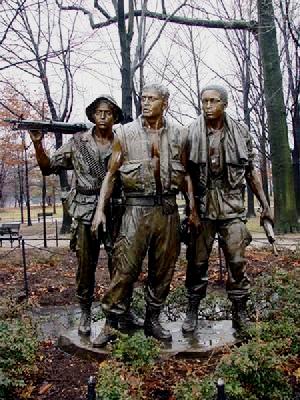
Memorial statue of three soldiers
In any event, these 300 men proved successful in battle.
After his victory over the Midianites Gideon returned to Succoth and tortured the elders of the city, because they had refused to give him and his men the provisions they needed.
Retribution and enforcement were necessary in this harsh situation, Gideon believed.
The men of Israel asked Gideon to become their king, but he refused because, as he said, Israel should have only one king, God. He then returned home and lived to a ripe old age.
(Judges 6-8 )
Maccabees and Hasmonean Revolt
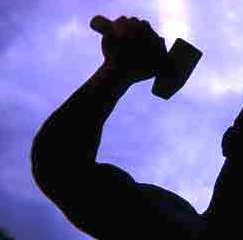 Maccabees 1 tells the story of the Hasmonean Revolt. The book describes the Jewish struggle for independence and the rebellion against idolatry.
Maccabees 1 tells the story of the Hasmonean Revolt. The book describes the Jewish struggle for independence and the rebellion against idolatry.
The rebellion began when a member of the Hasmonean family, Mattathias, refused to offer sacrifice to a pagan god and then struck down a Jewish man who had done just that.
To escape imprisonment, he fled to the Gophna hills, together with his five warrior sons. Many disgruntled Jews flocked to his side, becoming a formidable army under Mattathias’ leadership.
After Matthias died, he was succeeded by his son Judas Maccabeus (Judah the Hammer), a guerrilla genius who developed a model of underdog warfare.
Many of his followers were inspired by the idea of religious martyrdom – something which influenced the Jewish and Christian faiths for many centuries.
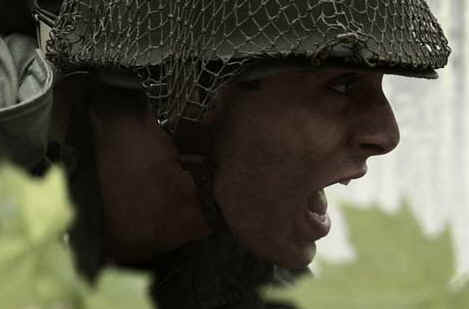 Judas was not tolerant of Hellenization, not tolerant at all. He did everything he could to crush and destroy Greek-inspired ideas and culture, including murdering many Jews who had become Hellenized.
Judas was not tolerant of Hellenization, not tolerant at all. He did everything he could to crush and destroy Greek-inspired ideas and culture, including murdering many Jews who had become Hellenized.
In 160BC Judas fell in battle, and was succeeded by his brother Jonathan, who was also made High Priest. He also died fighting.
The last surviving brother Simon did what had seemed impossible – he created and ruled a free Jewish state, the first for four and a half centuries.
Jephtah – bad luck
 Jephtah started behind the eight-ball.
Jephtah started behind the eight-ball.
- He was born to a prostitute in a society where family lineage was important
- when his father died and the inheritance was divided, Jephtah’s legitimate half-brothers drove him off
- he was forced to live the life of a bandit, gathering a motley group of thugs and thieves around him.
But the wheel turned. When war loomed for the Israelites he was courted by the very people who had thrown him out. They knew his prowess as a fighter, and they needed his help.
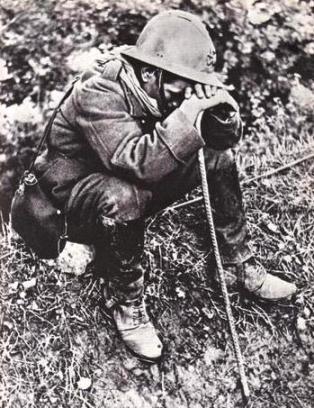
French soldier, World War I
This time he bargained with them: ‘I’ll fight for you’ he said, ‘but on my terms’.
He was victorious and became a national hero.
His story would have been forgotten had not Jephtah, just prior to the battle, bargained with God.
If he won, he told God, he would offer a sacrifice of the first living thing that ran to greet him when he returned home.
What he did not foresee was that the thing that ran out towards him was his only child, a daughter whom he adored.
But he kept his promise to God. He killed her.
See the story in more detail at Jephtah’s daughter
Omri, nation builder
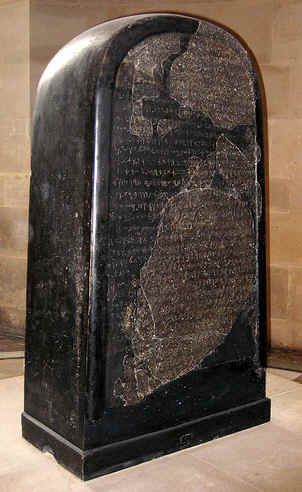
The Mesha Stele
The Mesha Stele
‘I am Mesha, the king of Moab. My father was king over Moab for thirty years, and I became king after my father. Omri was the king of Israel, and he oppressed Moab for many days. And his son reigned in his place; and he also said, “I will oppress Moab!” In my days he said so. But I looked down on him and on his house, and Israel has been defeated; it has been defeated forever!’
(Translation of part of the inscription)
There is no doubt that Omri was one of the great military commanders of the ancient world, but we know tantalizingly little about him.
This is because of his religious policies – he allowed his subjects to worship whatever god they chose, so the Bible has shown him in an unfavorable light, hardly mentioning him.
In fact, he was a strong military commander who made a play for the throne after the previous king, Zimri, was killed.
When this happened the country was in danger of splitting into two, but Omri
- gained control
- ended almost fifty years of civil strife
- unified the country again
- and founded a strong dynasty.
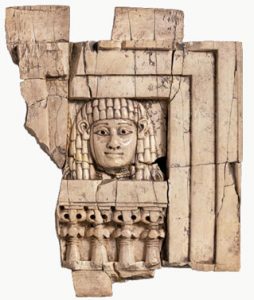
Ivory plaque from the site of the Ivory House in Samaria. It shows the notorious ‘Woman at the Window’, linked with sacred prostitution
This dynasty prospered for over forty years – not much by modern standards, but a stand-out success at the time. He laid the foundations of the Kingdom of Israel, and later Assryian inscriptions referred to the Kingdom of Israel as ‘Bit Humri’, the House of Omri.
A man of energy and vision, he also began building a new capital city for his country at Samaria. His palace was called the ‘Ivory House’ because of the lavish use of carved ivory plaques in its decoration.
Why isn’t the Ivory House better known? It outshone anything Jerusalem could produce, putting the Temple-based priesthood in second place. So they simple ignored it when they came to record events.
History is written by the victors.
Ahab: warrior king
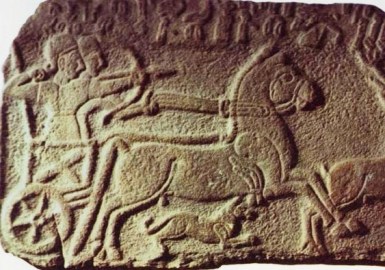
Ancient wall relief. The battle chariots of Ahab were similar, carrying an archer and a driver
Ahab is one of the most underrated kings of the Old Testament. He was one of the Bible’s most formidable soldiers and warriors.
- During his reign the kingdom of Israel played an important part in international affairs.
- He strengthened ties with Phoenicia in the north and Judah in the south, marrying a princess from Tyre (Jezebel) and then allying himself to Judah through the marriage of his daughter Athaliah.
He was a warrior as well as a diplomat – he had to be, because Ben-Hadad the king of Damascus engaged him in three separate wars. Ben-Hadad, together with thirty-two vassal rulers, was able to advance as far as Ahab’s capital Samaria, where he laid siege to the city.
Ahab drove him back, routing him in the process.
Ahab’s main enemy, however, was the Assyrian king Shalmaneser III. Ahab led a coalition of twelve kings who fought Shalmaneser at the Battle of Qarqar in Syria, one of the great battles of the ancient world.
Ahab provided 10,000 infantry and 2,500 chariots – or at least that is what the records show. The numbers may have been smaller.
But the fact remains that Ahab led a coalition of kings in a major battle of the ancient world, and he won. Details of the battle appear on the inscriptions of the Syrian king as well as in the Bible.
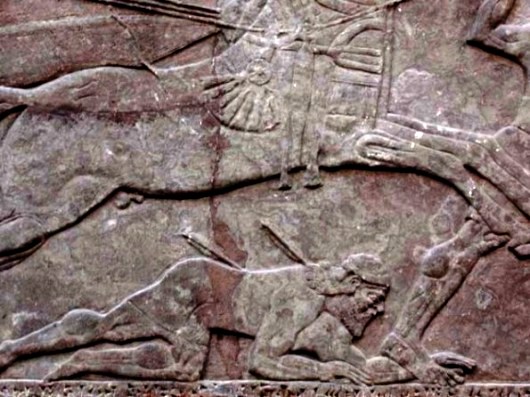
Wall carving from the northwest palace at Nimrud. A warrior mortally wounded by an arrow is trampled underfoot by a chariot horse
Peace could not be maintained. No wonder the Bible suggests Ahab was prone to fits of deep depression – see Jezebel takes Naboth’s vineyard.
Once again, Ben-Hadad broke the peace, and Ahab faced him in battle at Ramoth-Gilead. This time he dressed as a common soldier – leaders in battle were targets for archers, and it was prudent to use some form of camouflage.
The ruse did not work, and Ahab was mortally wounded by a random arrow.
But he fought on. When he could no longer stand, he had himself propped up in his chariot, so that he could see the fighting. As the sun went down on the battlefield, he died.
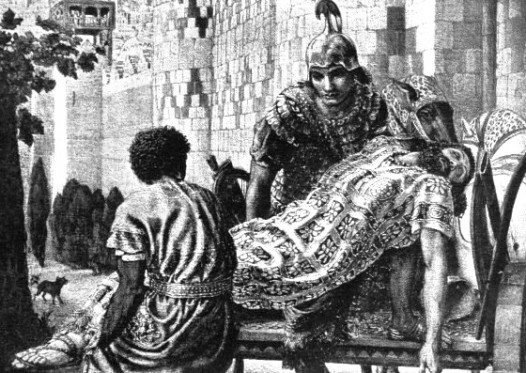
This picture is supposed to show the death of Ahab. In fact he would have been in full battle armour
Saul, tragic leader
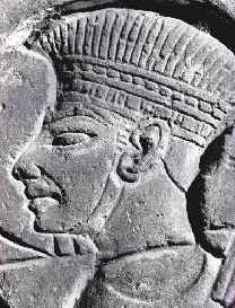
Philistine warrior, from a carving at Medinet Habu
Saul stood out from the crowd. He was handsome, tall and commanding – a charismatic leader.
But from the start he faced a formidable enemy, the Philistines, who occupied all the fertile land in the central hill country of Judah.
When Saul’s son Jonathan killed the Philistine governor at Geba, it was on for young and old.
The Philistines took up a position opposite Gibeah in the gorge of Michmash and Jonathan, without telling his father, scaled the cliff and killed twenty men in the Philistine outpost. In the ensuing fighting, Philistine control of the mountain area was broken.
Saul’s reign (and the reign of any tribal leader of the period) was a lifelong struggle against the enemy.
At the approach of Saul’s last battle he was filled with foreboding, and went to En Dor to consult a witch about the outcome of the battle – soldiers have always been superstitious.
The witch confirmed what he knew already: that the Israelite army had no chariots and could not withstand the assault of the well-armed Philistines. See what happened at The Witch of Endor
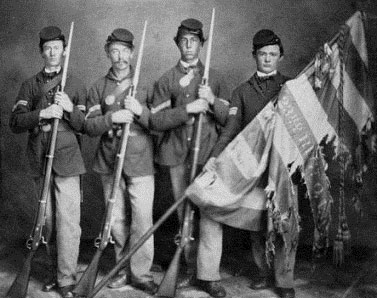
Photograph of boy soldiers
from the American Civil War
In the ensuing battle Saul’s three sons were killed, and he himself was seriously wounded.
In the last moments of his life he asked his amour-bearer to ‘thrust me through’, and when the young man refused, Saul fell on his own sword and died.
The Philistines found him and hung his decapitated body on the walls of their city Beth Shan, but some loyal followers removed the body and gave it an honourable burial.
Barak had a plan…

The name Deborah means a bee: ‘float like a butterfly, sting like a bee’
The Israelite general Barak was not eager to fight the large coalition of Canaanite kings. When you look at the odds he faced it’s hardly surprising.
- His enemy was more numerous, better equipped, and had excellent morale.
- Their technology was far superior to his – they controlled metal-making, so their weaponry was tougher than anything Barak could produce.
- The enemy general, Sisera, also had well-disciplined and seasoned troops.
As far as Barak could see, facing them would be tantamount to suicide.
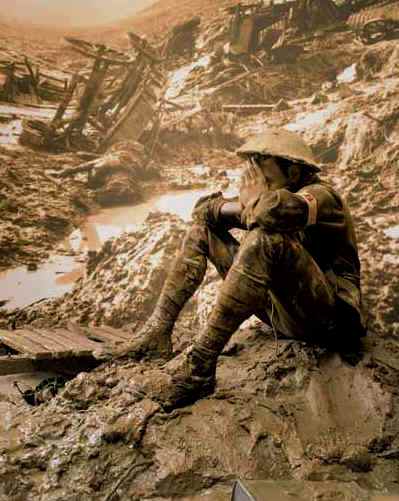
WW1 soldier lost in a sea of mud, as Barak was
He was eventually persuaded to fight by one of the most forceful women in the Bible, Deborah. She convinced him that winning a battle was not just a question of equipment and training, but of strategy as well – and she had a plan.
They staged the battle near a large swampy area that slowed down the formidable iron-wheeled chariots of the enemy – once these had had a brake put on them, so to speak, they would not be nearly as manoeuverable or effective.
At this stage, God stepped in and sent a rainstorm, which not only slowed down the chariots but brought them to a standstill.
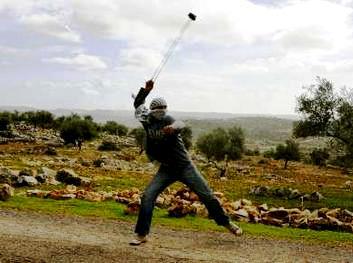
Young man using a sling shot
The archers who would normally have shot from the back of the chariots now had wet bowstrings and limited visibility. See the Bow & Arrow in War
Barak’s Israelite militia, on the other hand, excelled at hand-to-hand combat and in the use of sling-shots, and were able to vanquish their enemy.
Mud was their ally, and the day was won. See Bible Battles: Deborah & Barak
Bible Study Resource for Israel’s great soldier warriors
Joshua, Samson, David, Gideon, the Maccabees, Omri, Ahab, Saul, Barak, Jephtah
Links
SAMSON used the jawbone of an ass as an improvised club. Jewish warriors valued ingenuity.
DAVID defeated an enemy much stronger than himself by using guile and the tactics of guerrilla warfare – as Israel did.
JOSHUA .. the real hero of the story is Joshua’s God, who shows awesome power with only minimal assistance from the Israelites

GIDEON chose men who knew to drink from a stream lying full-length, offering the enemy a smaller target.
THE MACCABEES Judas Maccabeus (Judah the Hammer), was a genius who developed a model of guerrilla warfare
JEPHTAH was a national hero, but his story would have been forgotten if he hadn’t, just prior to the battle, made a dreadful bargain with God…
OMRI was a great military commander, but we know little about him because he let his subjects worship whatever god they chose…
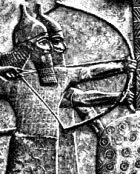
AHAB was mortally wounded but he fought on. When he could no longer stand he was propped up so he could see the outcome.
SAUL asked his amour bearer to ‘thrust me through’ and when the young man refused, Saul fell on his own sword and died.
BARAK was reluctant to fight the coalition of Canaanite kings, and it’s not surprising when you look at the odds he faced.
© Copyright 2006
Elizabeth Fletcher


